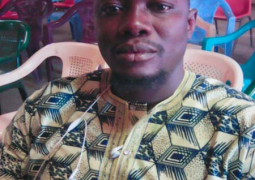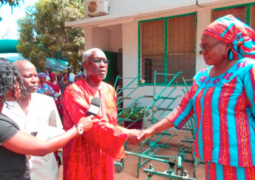
Dodou Manneh, the senior Interpreter at the Banjul High Court, criminal division is an excellent example of a perfect interpreter who has the gift of speaking all the major languages of the five continents where he had toiled as a sailor while based in Europe. He finds it incumbent on him to put the love of country first with the many difficult languages he has mastered. His parents had left for Senegal when he was a child and he grew up with a family that he called his and that had influenced his life positively. Let us see how this man with the gift of speaking Greek, French, Italian, Finish, Deutch, Swedish, Indonesian, Norwegian and many more tells us about himself, his job and life as a whole.
EIG: Could you kindly tell me about your early beginnings?
DManneh: I was born in Brufut in 1949 to my Gambian parents but at the age 5 my parents left me to settle in Senegal. A man called Y C Jow dad of the late Charles Jow at Banjul. I started school in 1955 to 1960 at the Mohammedan Primary School. I passed to the Crab Island Secondary School from 1961 to 1965, finishing with the Secondary Four Examination. I worked for a while with the USC Motors and in 1970 I left for Europe for five years and joined the Greeks seamen. I stayed around the Mediterranean, which is around Spain, Portugal, Italy and others. Within the seven years I came to learn English French, Spanish, Italian, Portuguese, Deutch, Denis, Swedish, Finish, Greek, and Indonesian. On the ground at home I interpret Wolof, Mandika and some Fula.
EIG: When did you return home and what did you get into with your wide experience?
DManneh: I returned home in 1982. I started working for the judiciary as an interpreter and I loved the job.
EIG: Where did you get your inspiration for the interpretation from?
DManneh: I was inspired by one Pa Faye when I was young. I since said I would love to be like him and it has happened. He was so inspiring! He was quite good in the art of interpreting then, he is my mentor.
EIG: Can you interpret all the languages into each from other?
DManneh: Most of these languages I can read and write. I can read and write French, English, Italian and I can interpret documents from Norwegian to English, Swedish to English Danish to English, Indonesian to English, French to English, and Portuguese to English. I can speak Greek but can't write it, they have two alphabets and I did not learn them. It is quite different from one speaking a language and interpreting it. The art of interpreting requires 60% of listening and 40% attention to relate it to the recipient.
EIG: Are you good at any other thing apart from these languages?
DManneh: Yes! I am very good at guitar, I am a guitarist and I can play it quite well, from the oldies and new songs.
EIG: What about your own family?
DManneh: I am married to a beautiful lady. I have my first son called Fisco living in the US. I live with my two other kids, Gibril and Fatou.
EIG: How did you feel when your parents left you at home in Brufut?
DManneh: Well, I miss my parents. When they left I did not feel it too much, there was no nostalgia. I was treated by YC Jow like his child with no difference. I thought at first he was a bad man but now realize he was putting us in the right path. He said our friends were our books, which have proven to be true today, no doubt about it. My parents are now deceased, about six years ago. I visited them and YC Jow made me go there during long vacations for two months. But I could not stay because I had that Gambian feeling in me, feeling of belonging which I could not let go. My country needs me and I love my country. Ask what you can do for your country not what your country can do for you.
EIG: Did you travel far and wide to acquire such marvelous languages?
DManneh: Yes! I was a seaman; I traveled to the 5 continents of the world. We went for months and came back and went again intermittently. This is how I was able to learn these languages. I learnt 5 words per day, which is normal for learning languages. I went with the Greeks because most of these languages have their basis in it like wise Latin.
EIG: Are there any penalties if interpreters misinterpret in court?
DManneh: Indeed! It is in the law that if an n interpreter misinterprets a judge, he is liable to a jail term of seven years.
EIG: What are the attributes of a good interpreter?
DManneh: We need to be strong and physically fit. Good exercise is needed because we stand for far too long. I walk from Brufut to Tipper Garage every Sunday and I walk a lot around too. This keeps you fit as I sometimes stand for four hours or more, using my brain and physical self.
EIG: Have you had any challenges in interpreting in court?
DManneh: Yes but once in 23 years. Lawyers do want to challenge me and ask where I learnt the languages from. Most documents I interpret are tendered through me but very few lawyers do ask me. I have done a lot of interpretation in the old court. I was challenged only by Lawyer Jobarteh. Whose documents I had interpreted but later challenged me for where I got it all from. I do translations for the Immigration, Health, and Ministry of Justice, Court cases, Court and Foreign Judgments.
EIG: Do you only interpret for courts?
DManneh: Yes! For the courts but not only for the High courts but the Magistrates court. I rotate when the need arises but I am based in the criminal section of the High court in Banjul.
EIG: Have you gained any experience in your past 23 year's service as an interpreter in the courts?
DManneh: I have acquired lots and lots of judicial jargons in the past 23 years. If knowledge could build mansion for one then I would have my knowledge could have built over 45 mansions by now. The languages are inside me, it's not heavy in my head it is just normal.
EIG: In case you are not around is there any one to step in your place as an interpreter?
DManneh: Yes! I know some people especially those who traveled with me to Europe. These are people who do not want to come because of the low salary. None would love to come forward with that salary condition.
EIG: Are there areas you would appeal to government for consideration in your job?
DManneh: They should upgrade my salary because it is difficult to interpret. Most judges are foreigners, they need interpreters and most cases too involve some other foreign nationals. I am being underpaid. More qualified people would not come forward of the low salary. You are paid today tomorrow the salary is finish; this causes mental destruction, which is not good in our job. One has to be mentally balanced and the government should create that for us to attract others to come on board. I know a friend who speaks about 18 foreign languages but he cannot come forward because of the poor salary structure. It takes one an effort to learn these languages, you see. They need to upgrade us then they will see more loyalty, efficiency and an added output. Still I am not discouraged; it's my duty to serve my country. I left about three years ago and came back to work. I would not accept this type of condition from any company or individual I work for but for my country I have. I believe and hope that the conditions will change. I believe a life dog is better than a dead lion. "Hatch Buy Dumda Mo Ghen Gaideh Gu Deh."
EIG: Have you any advice for your fellow interpreters?
DManneh: More dedication, more concentration, not to be discouraged, to see their jobs as one of the fundamentals of the judiciary. There should be no inferiority complex because one day things will be ok.
EIG: Any words of wisdom to the entire populace, sir?
DManneh: We are here not to add or omit. No impartiality. We are not here for anybody but to interpret what we hear, although sometimes it's difficult to interpret directly from one language to the other. And interpretation is an island you don't go out of it. There are some sentences in Wolof that any attempt to interpret them changes its original true meaning. This applies to Wolof and English. There is no boredom in interpreting. New cases, new people and new ideas including new drama keep coming day in day out, so we are not bored with the job.
EIG: Do you like to do anything at your leisure time sir?
DManneh: My hobbies are reading the Bible and the Quoran; they are my tools for the job. I like playing guitar, some Takwandoo to discipline my inner self and concentrate more within. I am not a materialist, I am a spiritual man. I believe in God and do not like to chase the wind.
EIG: We have ended our interview, thank you very much Dodou Manneh the strong agile man!
DManneh: Thanks for having given me the chance for such an interview. I dedicate the interview to all interpreters, let them be cool things will be all right. God bless you!



